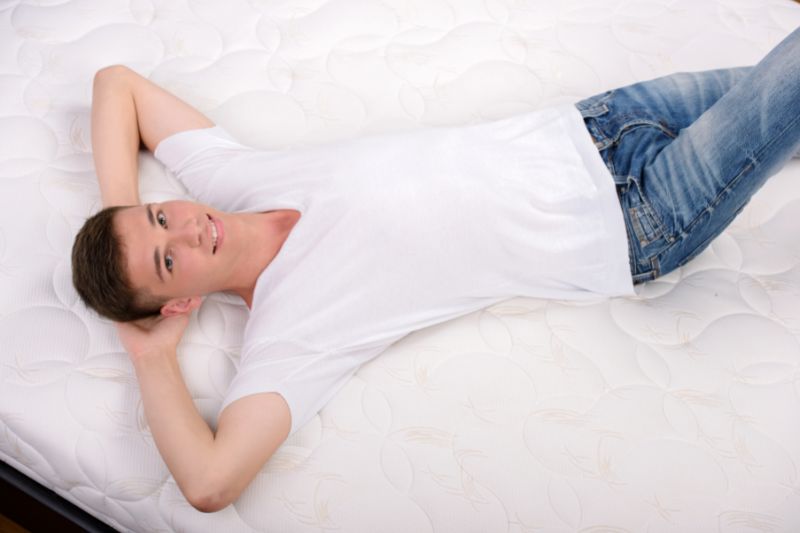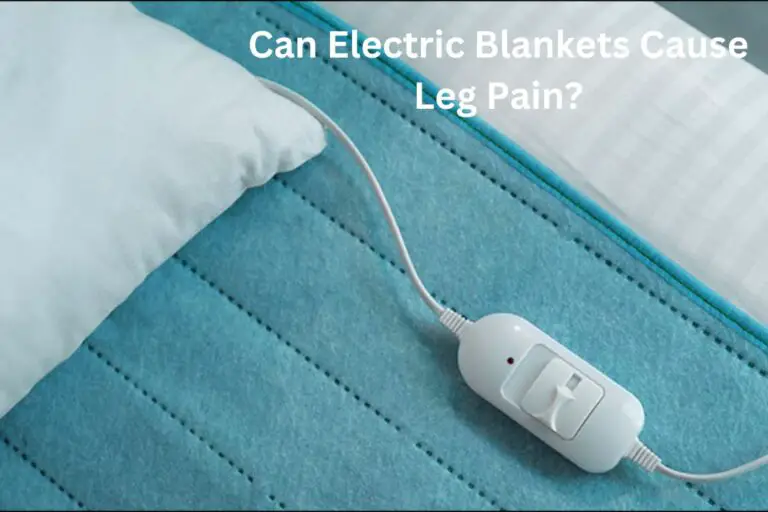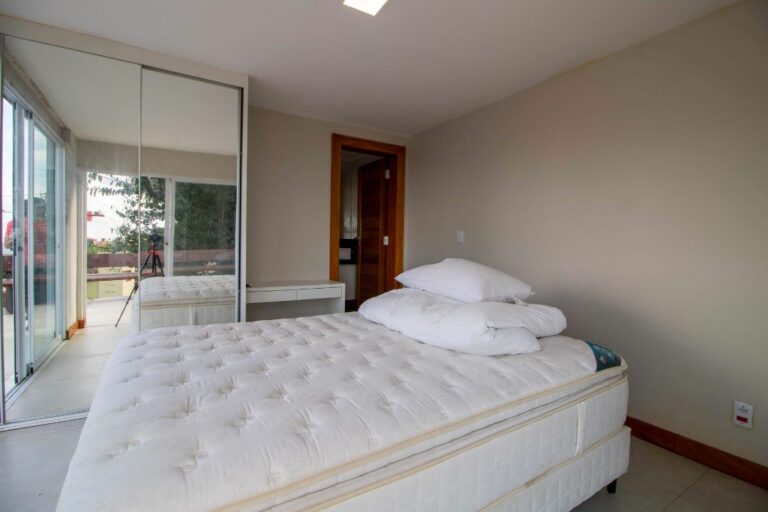Are Memory Foam Mattress Bad for Your Back? (EXPOSED)

Are Memory Foam Mattress Bad for Your Back?
According to the majority of medical professionals, this verdict is inconclusive.
Memory foam mattresses are generally considered to be beneficial for people with back pain. They provide support and cushioning, helping to reduce pressure points and improve spinal alignment.
Despite what you may have been led to believe, memory foam mattresses are not inherently detrimental to your well-being and health.
Rather than hampering it, these products help promote relaxation – perfect for those seeking a night’s rest!
To determine whether or not memory foam mattresses are actually harmful, we must first ascertain their ingredients.
Are Memory Foam Mattress Bad for Your Back?
Memory foam is often touted as a solution to back pain. The unique material’s ability to contour to its owner’s physique is thought by some to offer relief from potential aches and pains associated with sleeping on an unsupportive bed surface.
To be clear, memory foam is not specifically designed with any intention of relieving back pain or providing any type of therapeutic benefit.
It simply provides a firm yet cushioned sleeping surface that eases pressure on the spinal column, making it more advantageous than one composed solely of conventional materials such as cotton.
Some potential side effects of memory foam include reduced blood circulation and increased pressure on the spinal cord.
Ultimately, the verdict on whether or not memory foam mattresses are bad for your back is inconclusive.
While they may not be ideal for those with chronic back pain, they are generally harmless in the grand scheme of things.
Memory foam mattress vs. normal mattress
I previously left the rather vexed topic of memory foam mattress construction without delving into it much more deeply – for good reason, though!
This type of mattress fills up with a substance that’s designed to replicate the characteristics of your body when you’re lying down. This can make it more comfortable than conventional counterparts while still providing support during sleep.
However, there are several factors that could make a conventional mattress better than its memory foam counterpart: density and firmness.
A denser mattress will support your body more evenly and provide greater pressure relief, while a harder mattress will be less supportive and require more pressure to sink into the bed.
What is Memory Foam and How Does it Affect Your Back?
Memory foam is a prime material that has become a staple in the construction of beds, mattresses and other furniture. Its myriad applications are innumerable; however, what you may not know is that it also makes up a significant share of the substance used in cushions as well.
The memory-foam material consists of millions of tiny cells that interlock through cross-linking, giving rise to an astonishingly stable structure.
This remarkable property helps keep its buoyancy intact when exposed to pressure – which means that your back will remain comfortable throughout the night!
While this mattress technology is undeniably cutting-edge, it can also be quite intoxicating – particularly when compared with traditional memory foam materials.
If you’re seeking out units that incorporate innovative advances in sleep tech, then you’ll definitely want to consider opting for one of these exceptional bedding products!
The Pros and Cons of Memory Foam Mattresses for Back Pain:
If memory foam is your go-to solution for relieving back pain and discomfort, you are not alone.
This mattress technology has quickly become a staple in the relief business over the past couple of decades as it attracts customers like flies to honey; moreover, this material offers a plethora of advantages over traditional models such as greater accessibility to motion isolation and pressure relief.
Hands-free movement can be achieved without compromising on support with memory foam mattresses. This means that no matter how much tossing and turning occurs during sleep time – there will be none whatsoever!
Furthermore; due to its versatility they offer one of the most versatile options available within the market.
How to Choose the Right Memory Foam Mattress for Your Back?
To choose the perfect foam mattress for your needs, take into consideration what you prioritize most: pressure relief and support.
The three main criteria that should be considered when purchasing a foam mattress are firmness levels, temperature regulation and weight capacity – not forgetting price!
Begin by deciding on the level of comfort you require – whether or not it’s merely an inch away from any other mattress on the market would make all the difference in how well you sleep.
Next, select the temperature level that is most suitable for you. Temperature play can be quite entertaining; however, along with providing ample relief from aches and pains it may also provide restorative benefits if taken care of properly.
The Science Behind Memory Foam Mattresses and Back Pain
Despite their relative youth, memory foam beds have already amassed a wealth of scientific research supporting their widespread use.
In 2015, researchers at the University of Wisconsin identified the primary factors contributing to back pain within the US population, including poor sleep quality and mattress selection.
The majority of respondents acknowledged that their sleeping arrangement was either unsatisfactory or altogether unsuitable for them; moreover, 40% experienced continuous discomfort during slumber.
It was determined that the use of memory foam mattresses may have been responsible for the alleviation of their pain.
In a study published in the journal Sleep, scientists from Chalmers University of Technology in Sweden used a combination of MRI and thermal imaging to study the effects of memory foam on people with chronic back pain.
The results showed that individuals who slept on a memory foam mattress exhibited significantly less inflammation than those who slept on a traditional bed.
Furthermore; they also experienced reduced pain and improved function when compared with those who slept on an air mattress or on no bed at all.
Overall, these studies suggest that memory foam mattresses are an effective treatment option for people suffering from chronic back pain.
The Best Memory Foam Mattresses for Back Pain Relief:
To discover the ideal mattress for back pain relief, it’s essential to first identify what type of sleeping arrangement is most suitable for you.
Out of the myriad options available today – from single beds to king-size mattresses – there are numerous factors that must be considered when making an informed decision about your sleeping environment.
This can range from price; size and design; along with even user experience – which all need to be taken into account before purchasing your next mattress.
Memory foam mattresses are well suited for individuals who find themselves tossing and turning in their sleep. They provide a layer of cushioning between you and the unforgiving ground, providing comfort and support while you snooze away peacefully.
Aside from their obvious benefits, memory foam mattresses are also economical compared to other forms of insulating materials such as foam or latex; this makes them a wise choice when seeking out a lightweight solution for those plagued by back ache during REM sleep cycles.

What is bad about memory foam mattress?
If you’re an avid sleeper with little awareness of your posture, memory foam mattresses could be ideal solutions.
The unique break-in period makes it quite acceptable for some individuals to use them as their primary bedding choice – particularly those individuals who may have experienced back pain or discomfort from traditional spring units in the past.
Memory foam is renowned for its ability to mold itself to suit a range of body types, leading to increased comfort for many people.
Not only does this factor contribute towards better healthful sleeping patterns; additionally, it can even improve circulation and aid in relieving pressure on various parts of the body.
But for some users, memory foams may not prove ideal.
For instance, if you suffer from any pre-existing conditions such as: asthma or chronic obstructive pulmonary disease (COPD), an unyielding mattress could lead to worsening symptoms; while individuals with neck problems should consider carefully before opting for a memory foam bed.
Can memory foam cause lower back pain?
Memory foam is notorious for its tendency to accumulate body heat, which can lead to perspiring and an overheated backside. This could potentially exacerbate existing lower back pain issues or even induce new ones.
If you’re struggling with chronic lower back pain, it may be prudent to seek medical attention.
According to a report by the Journal of Clinical Sleep Medicine, there are several ways you might seek relief from this affliction; one among them being through mattress therapy – wherein patients sleeping on memory foam-based beds report improved sleep patterns compared with those who don’t!
Conclusion
For many individuals, one of the most vexing dilemmas surrounding memory foam is the question of whether or It is a beneficial material or not.
In order to ascertain whether memory foam can be beneficial or detrimental to your health, it is essential to understand both its characteristics and how it affects people’s lives.






